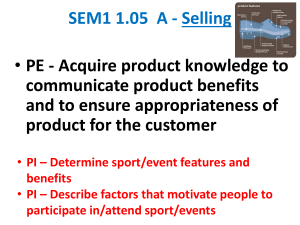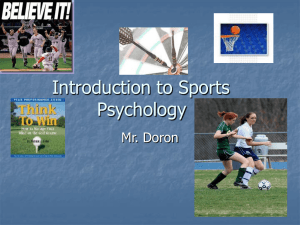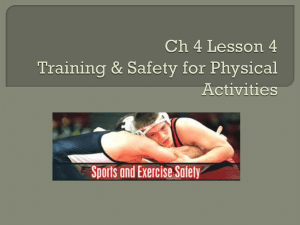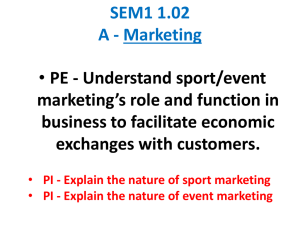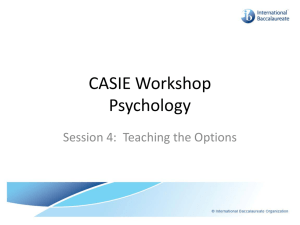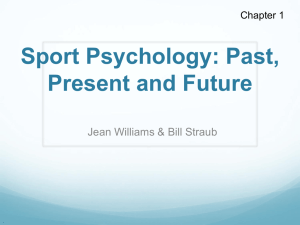Exercise and Sport Psychology
advertisement
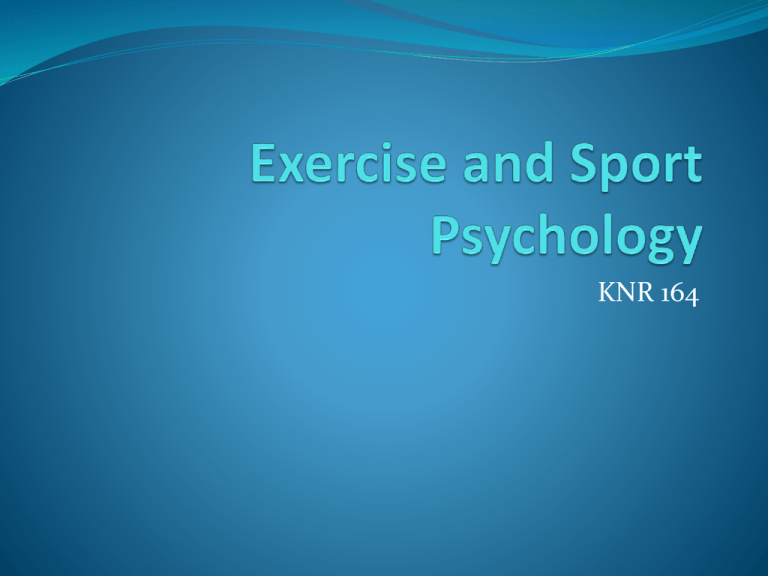
KNR 164 What is Exercise & Sport Psychology? Study of human thought, emotion, and behavior in PA Two main objectives: 1. To understand how psychological factors affect in individual’s performance 2. To understand how participation in sport and exercise affects one’s psychological development, health, and well-being. ABC’s of Exercise & Sport Psychology A = affect (emotion) How do anxiety or anger influence performance? B = behavior (actions) Why are some people so committed to a PA routine and others not? C = cognition (thoughts) Why do some athletes choke under pressure? Exercise Psychology Exercise Psychology: devoted to the study of the psychological aspects of fitness, exercise, health, and wellness Areas of interest: Exercise and mental health What is the relationship between PA and mental health? Exercise adherence What behavioral factors are related to exercise adherence? Exercise Psychology Exercise & Mental Health Psychological outcomes of PA, e.g. anxiety and depression Acute versus chronic exercise Exercise Adherence 50% of those that start new PA program drop out within first 6 months Adherence = regular participation 60-80% of time Employment Opportunities for Exercise Psychology College/University Teach, work on developing theory & conducting research on psychological benefits of PA Corporation Worksite health promotion Community Develop fitness & wellness programs for a recreation department Clinic Consultant for medical/PT clinic to help injured individuals through psychological aspects of injury rehabilitation Sport Psychology Sport Psychology: the study of mental factors related to improving competitive sport performance Areas of interest: Personality characteristics Do personality influence athletic performance? Pre-performance anxiety What is the relationship between preperformance anxiety and sports performance? Performance enhancement techniques Which performance enhancement techniques are more successful? Sport Psychology Personality characteristics Conflicting results on the impact of personality on performance early on. A negative relationship exists b/w psychopathology and performance (Morgan, 1985) Pre-performance anxiety Relationship b/w preperformance anxiety and sports performance More than 30 different anxiety measures Sport Psychology Performance enhancement techniques Psychological interventions to improve sports performance Mental Imagery Internalized mental rehearsal Goal Setting Attainment of a specific level of proficiency on a task Motivation What success and failure mean to that individual Intrinsic versus Extrinsic Motivation Confidence Enhancement Belief that one will be successful. Based on state and trait properties Sport Psychology Considered a graduate-level field Some schools offer undergraduate minors Fully credentialed ‘sport psychologist’ advanced degree in sports psychology required Employment Opportunities for Sports Psychology College/university teaching, research, working with collegiate athletic program Professional sports teams consulting sport psychologist for individual athletes or teams United States Olympic Committee national teams United States military various motivational and behavioral functions Clinical psychologist Sport and Exercise Psychology Orientations: Psychophysiological Orientation: 1. Best way to study behavior during sport / exercise is by examining physiological processes in the brain; brainbody connections Examples: Using biofeedback to train biathletes to shoot between heartbeats Examining changes in serotonin as explanation for psychological benefit of exercise Sport and Exercise Psychology Orientations: 2. Social Psychological Orientation Assumption is behavior is determined by interchange between person and their environment Examples: How does leader behavior influence team cohesion? Are people with high “esteem” more comfortable in samegender exercise settings? Sport and Exercise Psychology Orientations: Cognitive-Behavioral Orientation: 3. Emphasis is on athlete’s / exercisers thoughts and behaviors Examples: Is there a self-fulfilling prophecy linking self-talk and batting slumps? What does an exceptional athlete think about when “in the game” Can game preparation be influenced? Research Methods in Sport and Exercise Psychology Questionnaires Psychological inventories: standardized measures of specific forms of thoughts, feelings, or behaviors Interviews Structured, systematic to gain in-depth understanding of individuals’ beliefs, experiences or values Research Methods in Sport and Exercise Psychology Observations In field observation of behavior to study a phenomena naturally Physiological Measures Physical, mental, and emotional responses (biofeedback) including muscle tension and brain waves e.g. blood pressure and heart rate to assess effects of psychological stressors on individuals


